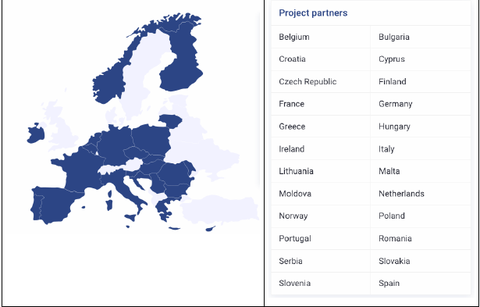iPAAC - Innovative Partnership For Action Against Cancer
In the Innovative Partnership for Action Against Cancer (iPAAC) project, a total of 24 partners and 40 associated partners from 24 European countries will work together over a period of three years to implement innovative approaches to fighting cancer. This will build on the results of the previous Joint Action CANCON (Cancer Control). As a result of this successfully completed previous project, the CANCON Guide (European Guide on Quality Improvement in Comprehensive Cancer Control) was published, which is intended to serve the goal of improving the quality of cancer care in Europe. The main objective of the iPAAC Joint Action is to develop a concrete roadmap for implementing and ensuring the sustainability of innovative concepts and measures to combat cancer. The use and development of synergies between the project participants and the implementation of solutions are two essential requirements that will be strongly emphasized throughout the project duration. The project aims to create added value at EU level by improving cooperation in the field of cancer through a comprehensive exchange of best practices, the successful implementation of different programmes and the progressive reduction of the cancer burden in Europe and the world.
Project partners
Background and objectives
Cancer remains one of the biggest challenges for the health sector in the European Union. Over the last eight years we have seen an intensification of activities at European Union level to combat cancer from various angles. Nevertheless, some important questions remain open in the fight against cancer. The iPAAC project, which is funded under the EU's Third Health Programme 2014-2020, will build on the results of the previous Joint Actions EPAAC and CANCON.
The aim of iPAAC is to develop innovative approaches to cancer control. The innovations will address areas such as cancer prevention, genomics in cancer control, cancer information and registries, challenges in cancer treatment, innovative cancer treatments and governance of integrated cancer care, including an analysis of national cancer plans. The focus of the Joint Action will be on implementation of results, as reflected in the intended outcome of iPAAC: the roadmap for the implementation and sustainability of cancer control measures, which will support Member States in implementing the iPAAC and CANCON recommendations. The roadmap will act as the central pillar of the Joint Action, integrating the different thematic areas, ensuring that cross-cutting issues are taken into account for all themes and acting as a central, integrating outcome. Various methods will be used to achieve the objectives of the iPAAC project, including pilot studies, working groups, expert panels, literature reviews and surveys.
A key added value of the iPAAC Joint Action will therefore be to support Member States in implementing the recommendations of iPAAC and CANCON at national, regional and local level. In addition, iPAAC will provide improved effectiveness in the treatment of previously neglected cancers by developing new key indicators to assess clinical pathways and costs of cancer and its interventions, especially in the case of pancreatic cancer.
Cooperation and implementation
The main target groups of iPAAC are both policy makers at EU level and decision makers at national, regional and local level. All innovative actions covered by the iPAAC work packages are assessed on the basis of sustainability and integration into national policies. Policy makers at Member State level will play a central role in the project. They will be officially included in the iPAAC Governing Council, which will meet twice a year to discuss the implementation of iPAAC and previous recommendations. The main actors at EU level will meet annually in Brussels to discuss iPAAC developments and synergies in the iPAAC Stakeholder Forum. The first will take place on 20 September 2018.
iPAAC officially started on 1 April 2018 and will last for three years. It connects 40 partners from 24 European countries and is coordinated by the National Institute of Public Health Slovenia (NIJZ). More information about the iPAAC collaboration is available on the official project website (www.ipaac.eu) or by contacting the coordination team ().
Our tasks in the project
The Helict team is involved in work package WP10, which is led by the German Cancer Society. Our task is to develop a method for the model-based design and implementation of patient pathways in a network of oncological centers of excellence. The aim is to transfer existing methods of reference modelling and model configuration into the context of clinical pathways and to create a practicable toolkit for the existing national cancer networks. The results will be implemented in two pilot regions, in Germany and Poland.
Contact persons:
Dr. Hannes Schlieter Contact
Peggy Richter, M.Sc. Contact
Further information:
iPAAC on Twitter: https://twitter.com/ipaac_project
Project website: https://www.ipaac.eu/
Forum Magazine Article by the German Cancer Society: https://link.springer.com/content/pdf/10.1007%2Fs12312-018-0441-0.pdf
Sponsored by:



